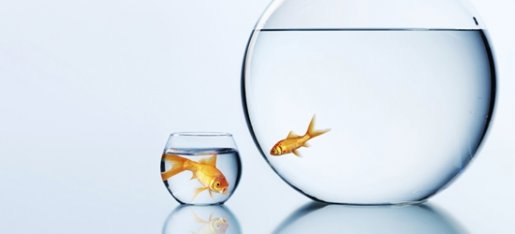'Help, I’m a tiny fish in a massive pond!'
We've all been there. That terrible sinking feeling, or the constant, almost invasive feeling, where you struggle through some research or finish your latest script, or have a bad day in the 'recording studio' only to sit there, head in hands after the whole experience and wonder. What is the point. Or, to be more specific Does anyone care. Or, to be even more specific, How am I ever going to make an impact - my history podcast is so small and other people's podcasts are so big?!
If any of these apply to you, then good (also, bad - you shouldn't feel that way!) because in this installment of the HPP, I'm here to help. In this piece I'm going to tell you why it's ok to be a small fish in a big pond, why you shouldn't feel disheartened, and why your work matters. Ready to go? Put your positive cap on, let's get started.
I'm a small fish in a big pond.
The cliché is being a big fish in a small pond, but neither podcasting nor history podcasting can be categorised as a small pond by any stretch of the imagination. It's a big world out there, and you'll have to work hard if you wanna stand out!
It is disheartening when you plug away for hours on something, knowing that your hard work is only going out to a small amount of people, and knowing at the same time that some history podcasters work not as hard as you, yet reach more people. Maybe, you even have a beef with some of them, and you don't like them or their style all that much. Maybe you're like me, and you're sick to death of seeing recommendations for Stuff You Missed in History Class or even Lore (not a real history podcast, I'm sorry Aaron but it's not). If these feelings sound familiar, then guess what - you're part of the problem.
'Hey, that's not very nice!' Well I'm sorry history friend, but look at it this way - who are you competing against? Why are you comparing your show to others? Why do you care what other people are doing so much? Don't you have your audience? Don't you produce your own quality content? Aren't you happy with your product? If you're not happy with you're show, then, well, I can't really help you, except to say go and make it good! Presuming that you are happy with what you put out there though, you need to stop what you're doing right now, and take a reality-check pill (not as well known as a chill pill, but still important).
You're probably not going to be the next Dan Carlin. You're probably not going to make a living off your show, and you're unlikely to make the evening news for your exploits in exposing the ridiculousness of the constitutional changes of Argentina during the 1846 elections. But that shouldn't be an issue to you - you didn't begin your history podcast with the expectation of hitting any of those goals, you began because you love history, and you want to bring it to people and create a community around it.
Don't get me wrong - of course be ambitious - heck if I hadn't joined Patreon and plugged away at it so often, I wouldn't be able to call WDF a part time job. And absolutely, aim for the stars where you can, and get the word of your pod out there as much as you can. But please, don't base your happiness or satisfaction on the positive outcome of these goals. Base it instead on the great work you're producing, and the satisfaction you derive from knowing that you made something useful, interesting and worthwhile.
If you are working at your history podcast to acquire some measure of fame, or to 'make it' in history podcasting land, then of course you're going to be disheartened, because the pool is so large, and you are so small. Being realistic doesn't mean that you give up, or aim small, it just means that if your podcast doesn't achieve the grand heights of success or fame you were expecting, you won't be upset. Now, of course, it isn't always easy to have this mindset, especially when we see others succeed and excel. Mastering it early on will really help you in the long run though.
The Mental Slog
Mentally, it can be a real challenge to be a history podcaster sometimes, especially if you're going solo. That's why it's important, not just to talk to other people and share your burdens, but also to accept that you are going to reach a set amount of people each week, and that this number will increase, but only gradually, after hard work and several years of plugging away at your show. To put it in perspective, having recently passed our 6th birthday and 4 million downloads overall, and reaching about 100,000 dl a month fairly comfortably, I am still constantly worrying myself about what other people are doing and how I'm not as big as them.
Thinking this way is ludicrous, because the more you dwell on it, the more you're setting yourself up to fail. Of course when you break it down like that, we know that it doesn't make sense to compare ourselves to others - podcasting is no different, and in history podcasting, where it's such a niche market anyway, the challenge is arguably even greater. How do we fight against these inbuilt tendencies? Like I said earlier, by deriving satisfaction from the quality and consistency of your work, by knowing that even if you reach only 10.100, or 1,000 people every week, those people are getting the absolute best from you.
The pessimist might say, again, 'what's the point' when your audience is so small, and I'm sure we've had these thoughts ourselves - I know I have. It's Sunday evening, I want to watch Game of Thrones with my wife, but I know I have to finish editing or else the people that are expecting the episode the next day won't get it. Something which has to be repeated time and again though is the following vital sentence - nobody is going to care about your podcast for you. If you don't do this - if you don't keep plugging at it and striving to improve, your podcast will die, and your listeners will disappear.
Nobody will ever truly understand what having your own history podcast means to you, just as surely as nobody will make you do any of this. You have to be your own boss, and sometimes boss yourself around even when it all seems pointless, because you know for a fact that those 27 people probably won't even listen to what you have to say. 27 people is still 27 people - as my Dad would say, you can still fill a room with that. Sometimes it helps to think of your listeners as individual people, since that is what they are, but the idea is often lost when these people receive the product week in week out without really saying anything back to you.
We are the faceless producers, and unless they decide to change, they are the faceless consumers. History podcasting is weird in that sense, but a really important, seriously underrated fact of history podcasting that I myself have forgotten on regular occasions is the following point - you're not just doing it for the listeners now, you're doing it for the listeners far into the future.
Your work will be there for later!
'Tiny fish syndrome' is easily tackled is you remember a point people tend to gloss over - your show, if it is good, will grow. In one year's time, people will be listening to what you produced now, and could well have a reaction that changes your life if they get in touch. For instance, my most popular series by far is the July Crisis Anniversary Project, which I did in summer 2014. At the time I was very excited to do it, but I had no concept of anything other than living in the now. Nearly four years later, I still get emails telling me they appreciated this work, and this fills in a point we made earlier on as well - your quality has to be top notch, because you won't only be judged now, you'll be judged well into the future, for as long as your show stays visible, and your episodes remain available.
So don't just make your show for the listeners you have now, and don't produce in the small fish mentality of 'it doesn't really matter because my audience is so small'. It absolutely matters - all of it matters, and if you don't take the time now to appreciate what you do have and to make what you have now mean something, then it won't mean anything when you release it tomorrow, and it'll repel potential listeners in one month, one year or six years' time. History podcasting, paradoxically, is most effective when we think about the future.
********
So I hope this helped those of you with some self doubt, and spurred you on to make your show better, and time proof. If history podcasting is something you enjoy, then make sure that enjoyment is based on your consistency and quality, rather than how many downloads you get, or how crap that other history podcaster is actually. You are building a house for the future, which other people will live in, so make it comfortable, and build it to last. Be healthy in your mindset and expectations, and for goodness sake, have fun!





